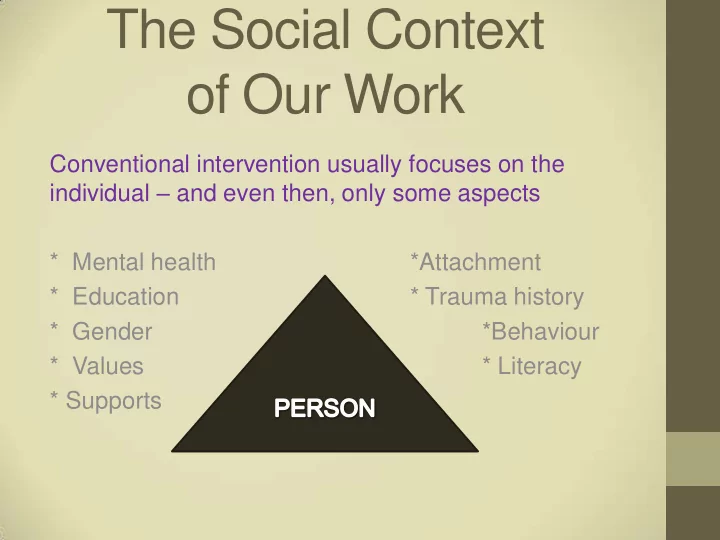

The Social Context of Our Work Conventional intervention usually focuses on the individual – and even then, only some aspects * Mental health *Attachment * Education * Trauma history * Gender *Behaviour * Values * Literacy * Supports
Sometimes, we may go as far as considering the impact of particular social issues. Race Person Ability Sexual Orientation Income Employment Person in Housing context
But we need to locate ourselves and the people we work with in the society. Person Person in context Societal Influences
Person Person in context * Individualism and Narcissistic Society * Socially Conservative and Competitive * Sexism, Racism and Homophobia * Commodifiaction, Materialism and Media Saturation * Medicalization and Sexualization *Decreased Social Supports and Transcience * Decrease in Manual Labour Positions and Increased Gaps Between the Rich and the Poor * War
Self/Client Assessment: What is our Common Ground SELF CLIENT Person Person Person in Person in Context Context Societal influences Societal influences
Conventional assumptions in helping professions… or what doesn’t work or isn’t necessarily true • People we work with have different goals • Equality • Mutual respect
• Naïve over-identification is positive • Minimizing the problem • The problem is shared • Medicalizing the problem
• Primacy of emotion • Low education = low intellect • Romanticizing culture of other • Individualism (decontextualizing anyone)
Validated and respected therapeutic methods: • CBT (Cognitive Behavioural Therapy) • MI (Motivational Interviewing) • DBT (Dialectical Behaviour Therapy) • Brief Therapy, Stages of Change
CBT, MI, DBT, Brief Therapy’ Client - centred, Narrative etc. Locating these Interventions With Marginalized and Oppressed People
Radical Caring and Truth Telling • Solidarity vs equality • Teaching and being taught • Acknowledging what you know and don’t know •Knowing clients’ experience of injustice
• Validating clients’ experience of injustice • Clarifying social context and individual decisions • Clarifying different kinds of power and efficacy •Don’t keep secrets (naming what you say privately - publicly)
• Naming strengths without condescension • Demistifying mental health • Demedicalize if possible • Destigmatize the right thing • Share examination of social context and comtemporary culture • Discuss ideas and belief systems – everyone’s – and impact on emotions
Practical Applications of Adding the Social Context • Negotiate limits of intervention with humility • Set practical, achievable goals and time line
• Shared accountability • Be actor and coach, not just a listener • Discuss what is equal and not • Outline victim and perpetrator experiences
• Anger: justified and unjustified • Validate with solidarity; challenge with truth – telling • Cultural and gender examples of passive, passive-aggressive and aggressive anger
• Use accurate concepts but explain them, including all mental health and psychological terms • Assign and explain homework; use books for record of progress • Accept, invite, model fair criticism
• You do the honest work of addressing difference (i.e., colour- blindness, gender issues, class, privilege etc.) • Deal with confidentiality issues
Understanding context of children of bi-racial parentage • Family of origin, name, immediate and extended • Colour – how do they look and what will it mean • Skin care and hair care
• Racism – the feelings in the family about the experience of being born from parents of different races – positive and negative • Relationship to black community – Close? Available? Distance? • Child welfare experience – worker insight, knowledge
• Isolation – other black kids, who, where, their own identities • Circumstances of birth parents, one time, marriage, hostility, confidence, relationship to others in community/family • Not white enough? Not black enough?
• Race and culture (access to the latter?) • Knowledge of history (by the caregivers – do they care?) • Age of child (differences in racial identity development – Robert Wright’s work) • Speaking it - colour blindness (whose, comfort levels)
• Racism insight by whites with child • Belonging - group identity – age of “choosing” – demands of peer group • Discipline •Popular culture’s portrayal of people of African descent
Recommend
More recommend